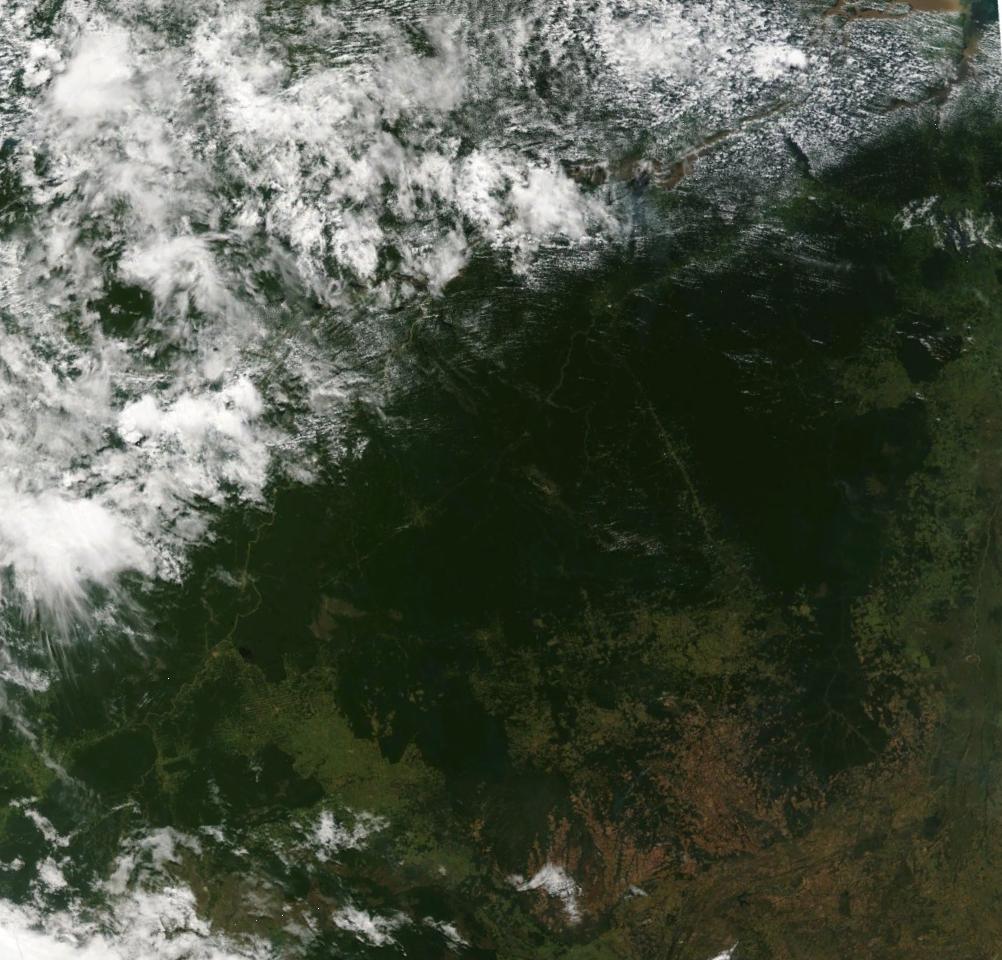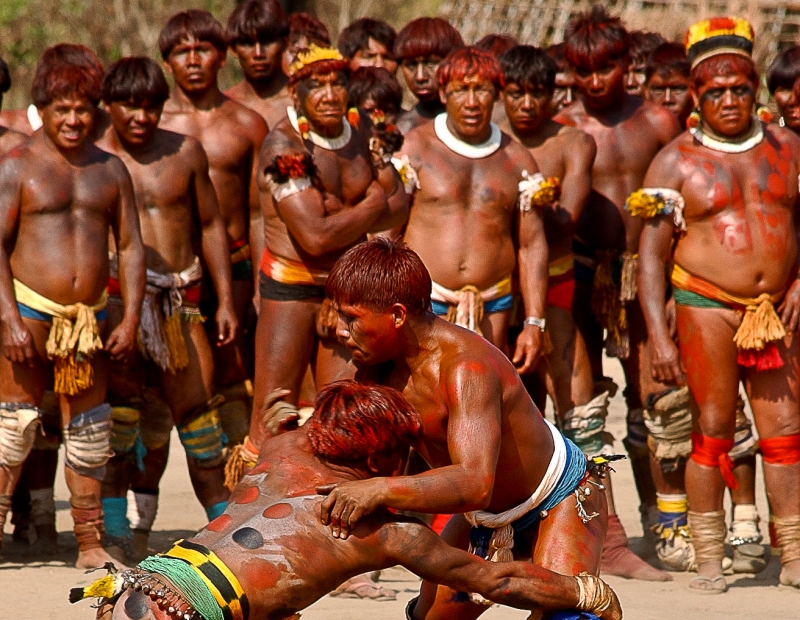|
Xerente
Xerente (alternate Sherenté, Xerentes, and Xerénte) are an indigenous people of Brazil living in Tocantins Tocantins () is one of the 26 states of Brazil. It is the newest state, formed in 1988 and encompassing what had formerly been the northern two-fifths of the state of Goiás. Tocantins covers and had an estimated population of 1,496,880 in 2014 .... The Xerente are a Central Jê people related to the Xavante. They maintained generally "peaceful" relations with outsiders from the nineteenth century onward. Their villages were traditionally built in a semi-circular fashion, but the society has largely assimilated Brazilian standards of organization. The Xerente creation myth is based on the duality of mythic heroes embedded in the sun and the moon, and this has resulted in a division between the exogamous moieties, with the sun moiety being called Doí and the moon Wahirê, each consisting of three or four clans. As of 2007 use of the native language among the 1813 me ... [...More Info...] [...Related Items...] OR: [Wikipedia] [Google] [Baidu] |
Jê Languages
The Jê languages (also spelled Gê, Jean, Ye, Gean), or Jê–Kaingang languages, are spoken by the Gê peoples, Jê, a group of indigenous peoples in Brazil. Genetic relations The Jê family forms the core of the Macro-Jê family. Kaufman (1990) finds the proposal convincing. Family division According to Ethnologue (which omits Jeikó), the language family is as follows: * Jeikó language, Jeikó (†) * Northern Jê ** Apinayé language, Apinayé (2,300 speakers) ** Mẽbengokre language, Mẽbengokre (Kayapó) (8,638 speakers) ** Panará language, Panará (Kreen Akarore) (380 speakers) ** Suya language, Suyá (350 speakers) ** Timbira language, Timbira (Canela-Krayô, with the Canela language, Canela and Kreye language, Kreye dialects) (5,100 speakers) * Central Jê ** Acroá language, Acroá (†) ** Xavante language, Xavante (9,600 speakers) ** Xerente language, Xerente (1,810 speakers) ** Xakriabá language, Xakriabá (†) * Southern Jê ** Xokleng language, Xokleng (7 ... [...More Info...] [...Related Items...] OR: [Wikipedia] [Google] [Baidu] |
Indigenous People Of Brazil
Indigenous may refer to: *Indigenous peoples *Indigenous (ecology), presence in a region as the result of only natural processes, with no human intervention *Indigenous (band), an American blues-rock band *Indigenous (horse), a Hong Kong racehorse * ''Indigenous'' (film), Australian, 2016 See also *Indigenous Australians *Indigenous language *Indigenous peoples in Canada Indigenous peoples in Canada (also known as Aboriginals) are the Indigenous peoples of the Americas, Indigenous peoples within the boundaries of Canada. They comprise the First Nations in Canada, First Nations, Inuit, and Métis#Métis people in ... * Indigenous religion * Missing and Murdered Indigenous Women * Native (other) * * {{disambiguation ... [...More Info...] [...Related Items...] OR: [Wikipedia] [Google] [Baidu] |
Tocantins
Tocantins () is one of the 26 states of Brazil. It is the newest state, formed in 1988 and encompassing what had formerly been the northern two-fifths of the state of Goiás. Tocantins covers and had an estimated population of 1,496,880 in 2014. Construction of its capital, Palmas, began in 1989; most of the other cities in the state date to the Portuguese colonial period. With the exception of Araguaína, there are few other cities with a significant population in the state. The government has invested in a new capital, a major hydropower dam, railroads and related infrastructure to develop this primarily agricultural area. The state has 0.75% of the Brazilian population and is responsible for 0.5% of the Brazilian GDP. Tocantins has attracted hundreds of thousands of new residents, primarily to Palmas. It is building on its hydropower resources. The Araguaia and Tocantins rivers drain the largest watershed that lies entirely inside Brazilian territory. The Rio Tocantins ... [...More Info...] [...Related Items...] OR: [Wikipedia] [Google] [Baidu] |
Xavante
The Xavante (also Shavante, Chavante, Akuen, A'uwe, Akwe, Awen, or Akwen) are an indigenous people, comprising about 30,000 individuals within the territory of eastern Mato Grosso state in Brazil. They speak the Xavante language, part of the Jê language family. History They were enslaved in the 18th century, after which they have tried to avoid contact. A temporary coexistence with westernized society in the 19th century in the state of Goiás,Giccaria, Bartolomeu. Xavante: Povo Autêntico. Editora Salesiana Dom Bosco, 1984, p. 35 was followed by withdrawal to Mato Grosso (between 1830 and 1860). They were "re-discovered" during the 1930s. From 1946 to 1957, they were brought under Getúlio Vargas' National Integration Program, but still experienced massacres and disease. Due to this history, they have a distrust of non-Xavante people. Today they are still wary of any approach of non-Xavante, called "waradzu". The Xavante leader Mário Juruna was the first indigenous Brazili ... [...More Info...] [...Related Items...] OR: [Wikipedia] [Google] [Baidu] |
Moiety (kinship)
In the anthropological study of kinship, a moiety () is a descent group that coexists with only one other descent group within a society. In such cases, the community usually has unilineal descent (either Patrilineality, patri- or Matrilineality, matrilineal) so that any individual belongs to one of the two moiety groups by birth, and all marriages take place between members of opposite moieties. It is an exogamous clan, clan system with only two clans. In the case of a patrilineal descent system, one can interpret a moiety system as one in which women are exchanged between the two moieties. Moiety societies operate particularly among the indigenous peoples of Indigenous peoples of the Americas , North America, Australian Aboriginal kinship, Australia (see Australian Aboriginal kinship for details of Aboriginal moieties), and Indonesia. Etymology The word ''moiety'' comes from Latin ''medietat-'', meaning 'a half', through Anglo-Norman_language, Anglo-Norman ''moité''. R ... [...More Info...] [...Related Items...] OR: [Wikipedia] [Google] [Baidu] |
Energias De Portugal
EDP (formerly EDP - Energias de Portugal and Electricidade de Portugal) is a Portuguese electric utilities company, headquartered in Lisbon founded in 1976 through the merger of 14 nationalised electricity companies. History EDP was founded as ''Electricidade de Portugal, E.P.'' by the Portuguese government though the Decreto-lei n.º 502/76 published on 30 Jun 1976, merging 14 former energy companies that had been nationalised by 1975 in the aftermath of the regime change in 1974, of which the most significant had been the ''Companhia Portuguesa de Eletricidade'' (CPE). In 1991, through Decreto-Lei n.º 07/91 of 8 January, the Government changed EDP's legal status from a Public Company to a Public Limited Company with exclusively public capital. In May 1994, after a profound restructuration of EDP, E.P., carried out between 1991 and 1993, under the Tutelary of ''Mira Amaral, Minister of Industry e Energy of the XII Portuguese Constitutional Government'' and the Presidency ... [...More Info...] [...Related Items...] OR: [Wikipedia] [Google] [Baidu] |
Indigenous Peoples In Brazil
Indigenous peoples in Brazil or Native Brazilians () are the peoples who lived in Brazil before European contact around 1500 and their descendants. Indigenous peoples of the Americas, Indigenous peoples once comprised an estimated 2,000 district tribes and nations inhabiting what is now Brazil. The 2010 Brazil census recorded 305 ethnic groups of Indigenous people who spoke 274 Indigenous languages of the Americas, Indigenous languages; however, almost 77% speak Portuguese language, Portuguese. Historically, many Indigenous peoples of Brazil were semi-nomadic and combined hunting, fishing, and hunter-gatherer, gathering with migratory agriculture. Many tribes were massacred by European settlers, and others assimilated into the growing European population Brazilians, Brazilian population. The Indigenous population was decimated by European diseases, declining from a pre-Columbian high of 2 million to 3 million to approximately 300,000 by 1997, distributed among 200 tribes. Accor ... [...More Info...] [...Related Items...] OR: [Wikipedia] [Google] [Baidu] |


